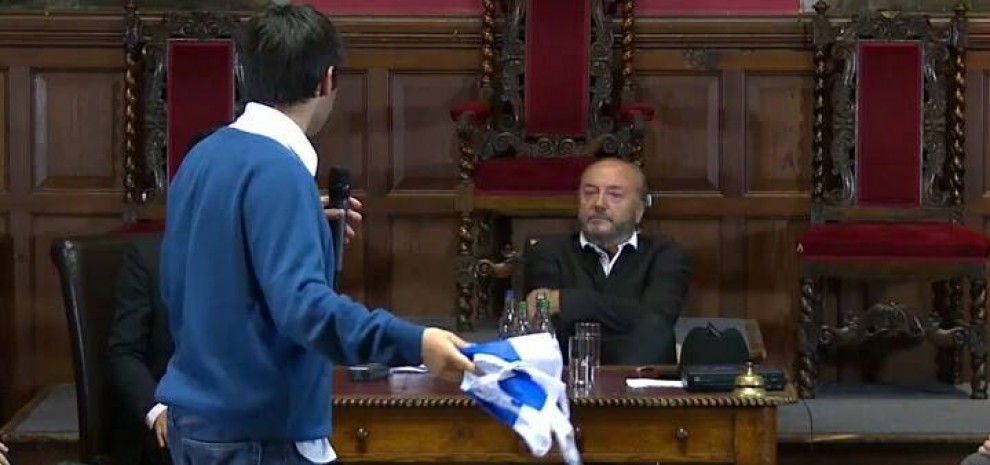
Israel Boycotter Dr. John Chalcraft (L), a reader in the History and Politics of Empire/Imperialism in the Department of Government at the LSE v Prof. Daniel Hochhauser (R), a consultant medical oncologist.
To boycott or not to boycott?, that was the question asked last night at The London School of Economics.
Arguing for the motion, This House Believes in an Academic Boycott of Israel, was Dr. John Chalcraft, a reader in the History and Politics of Empire/Imperialism in the Department of Government at the LSE.
Opposing the motion was Prof. Daniel Hochhauser, a consultant medical oncologist specialising in the treatment of gastrointestinal cancer.
Chalcraft gave a ten minute presentation. Hochhauser responded. Both then had a few minutes to sum up. A Q&A was then followed by some final words from each before the vote which strongly went Hochhauser’s, and Israel’s, way.
Somewhat bemusingly, Chalcraft started off by arguing that he wasn’t proposing a boycott of Israeli individuals but academic institutions. Hochhauser responded that academics cannot exist without institutions.
Then Chalcroft outlined how the Israeli government funds military research at Israeli universities, which helps the Israeli Army oppress the Palestinians.
Hochhauser responded that this is usual for any country which wishes to have a military defence. The British government makes grants to British universities for the same thing and there are no proposed boycotts of Harvard, Yale or Columbia Universities considering that many more people have been killed in Afghanistan and Iraq than the rest of the Middle East.
Neither is China boycotted over Tibet, nor Turkey over the Kurds or the UK also over Iraq and Afghanistan.
Chalcraft responded that there isn’t a boycott of American universities because it would not be an effective tactic, without expanding on what would be an effective tactic.
Hochhauser dismissed accusations of apartheid as over 20% of the students at Haifa University, The Hebrew University and Bar Ilan University are Arab Israelis and one of the judges that convicted Moshe Katzav was an Arab Israeli. But still, incredibly, Chalcraft referred to Israel as an apartheid state.
Hochhauser was also amazed that Chalcraft is a manager of the LSE Middle East Centre which is charged with developing “research and teaching on the societies, economies, polities, and international relations of the region, which includes Arab states, Iran, Israel, Turkey, Afghanistan and Pakistan”.
All very commendable but Chalcraft’s presence destroys the centre’s credibility.
It was, however, Hochhauser’s initial statement which, for me, made the biggest impact. He explained that as an oncologist he uses treatments for cancer developed at the Weizzman Institute and how detrimental any boycott of Israel would be for his patients.
It would have been interesting if someone had asked Chalcraft during the Q&A whether he would ever refuse an Israeli-developed treatment for himself.
The audience responded in Hochhauser’s favour when the vote was taken, which was all too much for one person who, reportedly, threatened an anti-boycott member of the audience on the way out.
It is worth listening to the audio of Hochhauser’s presentation below.
Audio recordings of all the debate:
Dr. John Chalcraft’s presentation at LSE boycott debate
Prof. Daniel Hochhauser’s presentation at LSE boycott debate.
Dr. John Chalcraft summing up for LSE boycott debate.
Prof. Daniel Hochhauser LSE boycott debate summing up.
Video recordings of parts of the debate:

Richard
I am not good at praising but you have a way of summarizing these events which are “my cup of tea” – thank you!
Seconded.
Thanks. It was a nice evening…for once.
Every cloud has a silver lining, apparently John Lewis are no longer stocking Ahava.
http://www.commondreams.org/newswire/2011/01/14-0
Can’t you just smell the Jew-hatred even across the Internet?
Get a life Yoni
I have a life, moron. It’s you who is so steeped in hatred that it poisons every aspect of your life.
I traced this link back to its supposed source on Al-Jazeera, but there’s nothing there. I suspect the truth is that John Lewis never stocked Ahava in the first place (my wife is a regular shopper in their beauty section and she’s never seen it there) and gemeitdreams.org made up the ‘quote’ from the John Lewis spokesman to make the BDS lobby seem more influential than it is.
Oh, so has ‘The Bay’ (Hudson’s Bay Company)
http://mondoweiss.net/2011/01/canadian-retailer-the-bay-drops-ahava-cosmetics.html
Fantastic result. Hochhauser was spot on in researching the BRICUP and PACBI websites and showing their problem is with Zionism and the creation of any Israel in the first place. Which is an excellent defence of Ahava, since it shows how its detractors fundamental problem is not with the 67 borders. It is with the 1947 UNSCOP, and earlier. They implicitly endorse, pardon or ignore the Palestinian and other Arab war against the Jews of Palestine, or the ‘resistance’, as they like to call it, which is why Israel had to conquer the WB in the first place.
Hochauser alludes to how PACBI et al. simplisticate a complex historical situation, into black and white, good and evil etc.
Who was that idiot the other day, one incapable of reading a map, who claimed that Israel is not entitled to exploit the Dead Sea’s resources because it didn’t have access to the Dead Sea even under the so-called ‘1967 borders’? Was it Mostly?
The fact that Dr. John Chalcraft is a Manager of the LSE’s new Middle East Centre is especially interesting given the story here:
http://edgar1981.blogspot.com/2010/12/lse-s-new-middle-east-centre-eradicates.html
Edgar
I find it funny that Dr. John Chalcraft, a reader in the History and Politics of Empire/Imperialism in the Department of Government at the LSE, ie: an expert in this field, was beaten by an oncologist!!!.
Just goes to show how silly the debate is.
Rebecca, I am afraid that being a reader at university x is no longer proof that one is an expert in anything, up to and including the field named in the title.